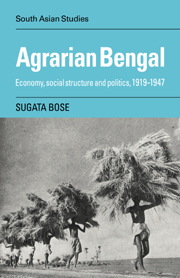Summary
This book has challenged some of the ruling orthodoxies in the modern social and political history of rural Bengal. It has shown the limitations of the ‘jotedar’ thesis by developing a typology which is more representative of the agrarian social structure in Bengal. This broader typology and the new periodisation of peasant politics in the province can provide a useful basis for comparisons with other agrarian societies. But most importantly, the study has exposed the bankruptcy of the colonial revenue administration as the framework in which to examine Bengal's agrarian economy and society. Rural Bengal has to be seen inside a context which takes account of the twin strands of subsistence and market uncertainties, the consequence of demographic constraints and the unenviable position of an agricultural exporting economy on a colonial periphery of the world economy. The focus has been on the impact of the global crisis of the 1930s on the agrarian economy and society of the region – especially the differential impact on the types of social structure that predominated in the different areas – and the implications it had for the nature of peasant politics in the climactic decades of British rule in India.
The chain of credit relationships provided the transmission belt along which fluctuations in the world market, compounded by the colonial government's financial policies, were mediated to the regional economy. At the same time, credit relations formed the key thread in the texture of agrarian relations within the region.
- Type
- Chapter
- Information
- Agrarian BengalEconomy, Social Structure and Politics, 1919-1947, pp. 274 - 280Publisher: Cambridge University PressPrint publication year: 1987



